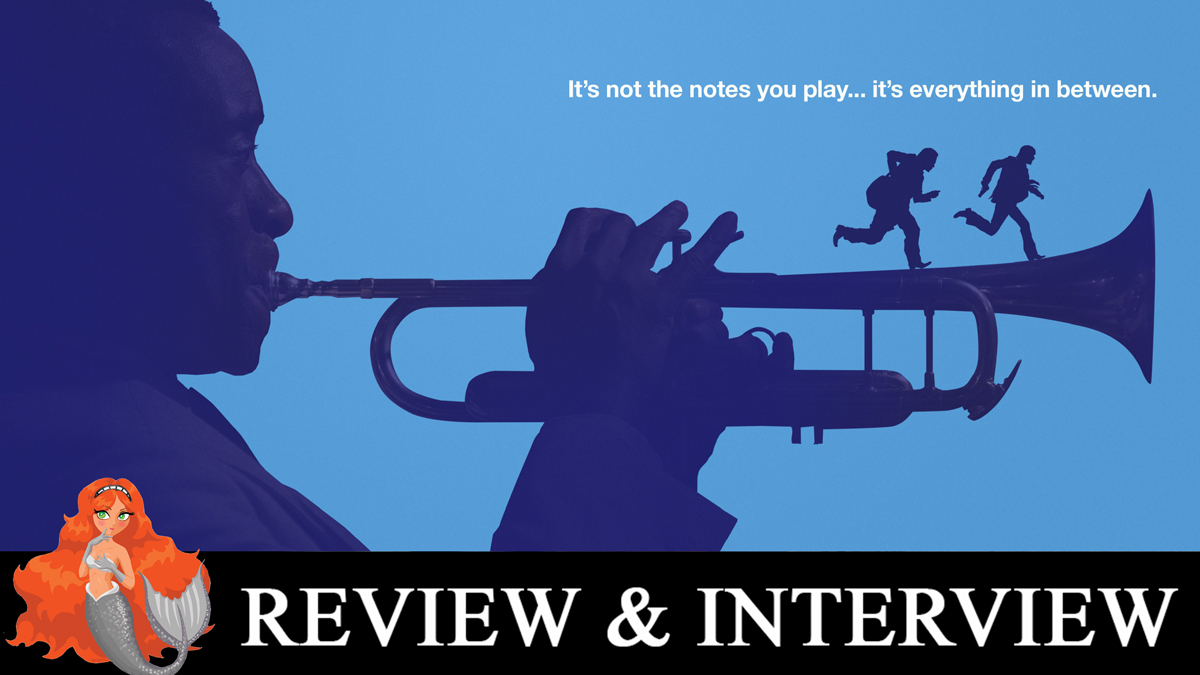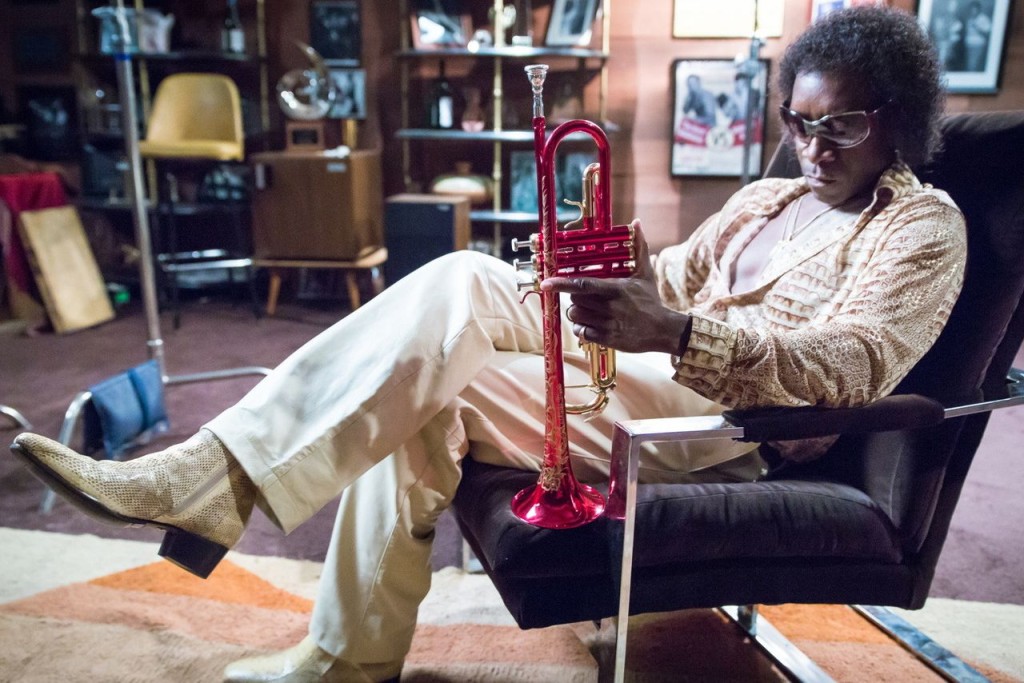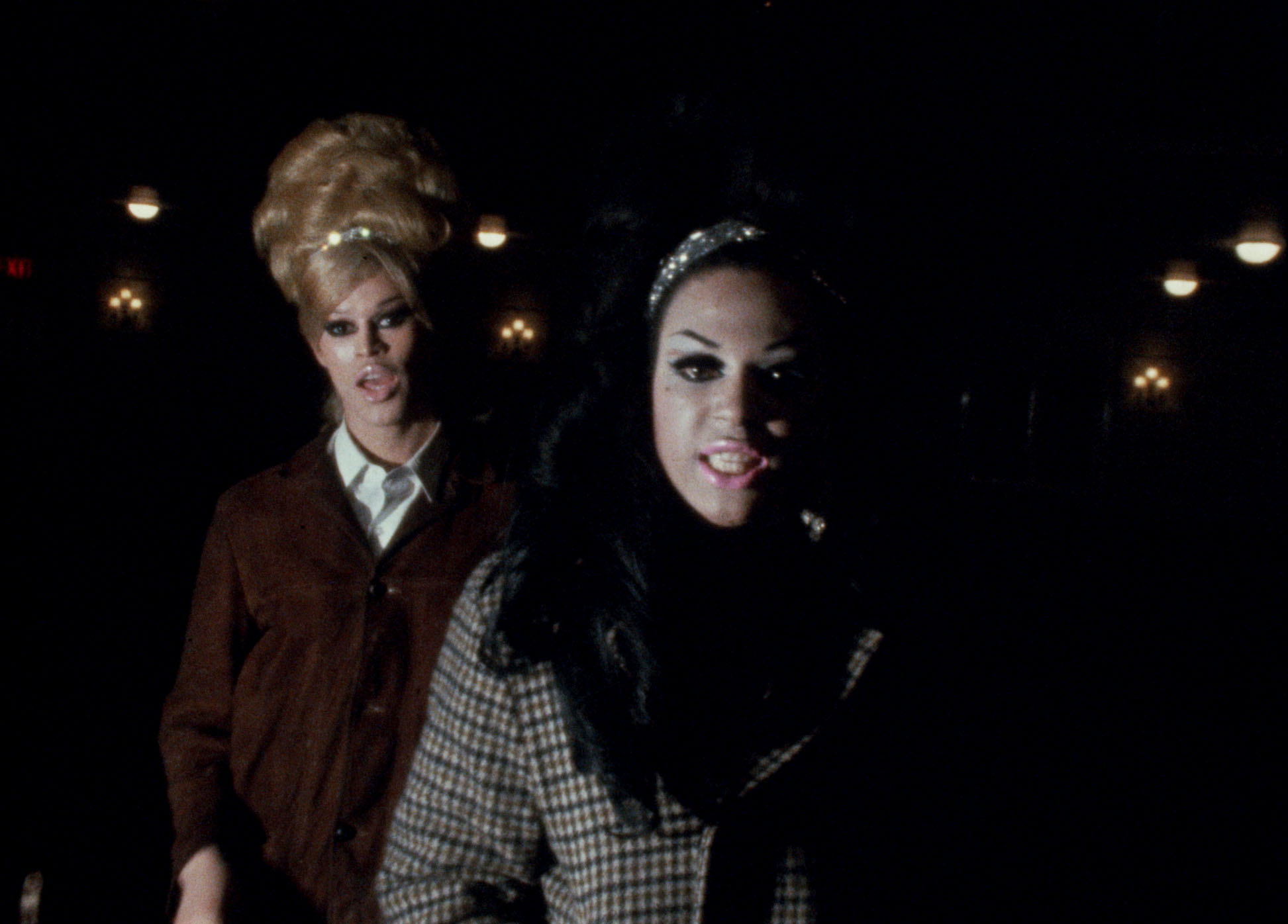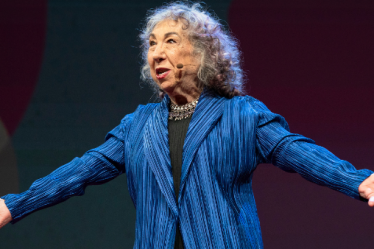

Full interview transcript:
Fan favorite and Oscar winning actor Don Cheadle is finally seeing his directorial debut and passion project MILES AHEAD released. Will the funky biopic anchored in the time Miles Davis was creatively stagnant in the late 70s starring Cheadle as the iconic musician find an audience, and does it prove itself worthy of its subject?
If ever a biopic was the cinematic equivalent of a experimental jazz fusion improv, MILES AHEAD would be it. It weaves together extended metaphors in the form of completely fabricated characters and storylines representative of aspects of Miles Davis’s persona, memories, and paranoid imaginings, with real events from his decidedly bizarre, avant-garde existence and personal history. Those who know the work and art of Miles Davis will recognize the truth in both the factual and metaphoric aspects of MILES AHEAD, the name of which is taken from Davis’s 1957 album. Whether it results in a fully formed success as the first biopic for a legend of what he himself called “social music”, is arguable. Much like the music it emulates, however, it’s certainly never dull, and always engaging.
Cheadle embodies Davis in every way, down to his famously furtive and mercurial physicality, his lack of eye contact and his raspy voice. His portrayal is mesmerizing, and explains why Miles Davis’s family was so committed and so intent in having him portray the musician. The supporting cast also commands audience attention, which is essential to carrying viewers through some of the more impressionistic, sometimes confounding elements of the movie. An invented action flick-like hunt for master tapes, complete with car chase and flying bullets, stands in, one assumes, for the cocaine-fueled firings of Davis’s brain synapses. For so much movement, it nearly stops the film in its tracks. It speaks to Ewan McGregor’s trust as an actor that he commits 100% to being a part of Cheadle’s unique vision in expressing Davis’s genius.
By Cheadles’ own explanation, MILES AHEAD is meant to be as improvisational. The director/actor/writer offers a piece, a slice of Davis’s personal history, as frenetic, freeform, and unpredictable as the music in Davis’s long and diverse career. For those in the Davis fan camp who know his life, there is much to recognize. Davis is haunted by memories of dancer and ex-wife Frances Taylor, who acted as his muse featured on the cover of “Someday My Prince Will Come”. She’s played with luminosity and sass by Emayatzy Corinealdi. Actor Keith Stanfield stands out as the young musician named Junior who has an abusive relationship with his wife Janice. All who know the musician’s life know he represents Davis himself as a younger man, who had the nickname Junior and whose first wife, whom he hit, was named Janice.
With the director’s choice to mimic Miles Davis’s singular vision and challenges for the movie, MILES AHEAD was destined to be divisive and only successful in part. Choosing to capture Davis’s risk taking, no-holds-barred style of musical artistry and expressing it as film means creating something obtuse and at times incomprehensible. As a musician, Miles Davis thrived on leaping into an experience without a net. To him it was the leaping that was an integral part of the art, and whether it held together or not, the risk was worth it. The same is true for MILES AHEAD. If it doesn’t always hold together, it is the best testament and tribute to him for Cheadle as a filmmaker that he was willing to leap out, whatever the result. As Miles Davis himself said, “Do not fear mistakes. There are none.”
While it may flummox those searching for a purist’s biopic, given the iconoclastic nature of Davis’s life and contributions, who really wants that? If you want to experience a bit of a genius from inside his head, MILES AHEAD is well worth the trip.
B-
EXCLUSIVE INTERVIEW WITH DON CHEADLE:
MILES AHEAD director Don Cheadle always knew he would not be doing a straight-ahead, traditional biographical film. In his appreciation and respect of Miles Davis, he had in mind to create a film that sprung forth from the brain and creative spirit of the artist. He talks about what it was like to be inside the experience of creative paralysis Davis was experiencing during the time represented in the film:
“I think, in a way, being an actor who is usually being handed material to flesh out and to work with, you get the clay and it’s already in some kind of a form. As the writer, part of it’s a lot different. Having been a writer and written several scripts, that’s when all of that stuff comes rushing up. Its just me and what i can figure out. That’s when that paralysis, that’s when that block of, you know, you sit in that room and then want to do anything else but be sitting in that room. You need to have handcuffs to the chair sometimes. I think that’s what Miles found himself in. You know, I talked to Vince and he said, well I said “why did he stop,” and he said, “he didn’t know what to say, he didn’t have anything to say.” He said so much up to that point, you know, what do you do when you’re like ‘ah, the tap just ran out.’ A lot of that makes sense why you have to sit still that long to kind of figure it out and let that stuff all churn. Although, Miles admittedly did not know that that was something, he did not know that he was going to stop for five years, and he didn’t know if he was ever going to come back. To hear him talk about it he wasn’t concerned. Now others around him, were “it was eating him up.” They were dying. Vince says the first time he heard miles try to play after he came back from that, and he couldn’t – we show it in the movie – he couldn’t make sound, and it just, he said he just wept. He just sat there and cried. And Miles was like, ‘Don’t cry around me!’ It just destroyed him. But, you know, this is that swing that sometimes you go through, when you feel the water go out and it’s like ‘What now? What next?’ Nobody can answer that for you. You’ve just got to figure it out. And that’s why we had this, the Miles Davis that’s in the movie, with this nineteen year old kid walking alongside of him. He’s the person who unlocks the code. He’s the person that cracks that for Miles, that says, ‘No, there is something going on in here.’ When we’re in that place, I think each one of us is the one that wakes us back up. That original searcher, that first kid who went “oh, I want to do this.” That’s who you have to get back in touch with to get you back on your feet.”
I asked Cheadle if finding that place was about accessing optimism:
“I think it’s stronger than that. It’s not, it’s not usually result oriented. It’s not optimism as it sits against some thing that you’re going to get as a result of it. It’s usually just a naked desire to do something and figure something out. At that point we often have a high – a low threshold, a low expectation of success and a high tolerance for failure. And as we get older that thing often flips and then you don’t move because you’re like, ’It may not work. What if it doesn’t happen? What if I fail? What if?’
And if you’re built in that upside down way, it’s really hard to do anything because you have to fight through so much fear to get out of your own way. There was a considerable amount of that for me, so in a lot of ways it was meta. Because I knew I was going to be doing something where lot of people who would go ‘What are you doing? You’re not going to talk about John Coltrane and you’re not going to talk about when they did ‘So What’?’ And to that I say, no i’m not…and in fact, when all of those things come up I’m going to have Miles Davis attack it, right then and there. ‘Jazz? Don’t call it jazz….’ This is how I’m going to do it, I need the Miles Davis that says, ‘You want the Miles Davis story? I was born, I did this, I did that. Are we done with that?’ I’m join to attack it. I’m going to just put it up and attack it, and hopefully after I do that three or four times, people will go ‘Oh, ok I guess we’re not doing that. I guess we’ll just watch this now.’
Judge it on what it is, if you want to judge it on what it isn’t, There’s nothing that we can do about that. This is what it is. I saw somebody say at the end, when Miles turns and you see the hashtag #SocialMusic on his back, ‘There weren’t hashtags in 1980!’ Correct! There was no Twitter then, right. There also was no flat screen TV that’s behind Miles Davis in the very beginning, when the interview is happening. Time is permeable and malleable. Miles Davis is still here and all of that is still happening. That’s what I hope that people take away from it, just an experience and being entertained and engaged and having the desire to learn more, hear more, mostly, more than anything, just hear more.”
Lastly, he talked about the wonderful scene at the very end of the film when Cheadle as Miles Davis plays with some of the heaviest hitters in the jazz world, both iconic and new. I mentioned even Miles would have chosen to have Esperanza Spalding and Gary Clark Jr., who were featured in that scene of live music:
And Antonio Sanchez, too. I mean Antonio was just coming off of Birdman. I’d see these guys at gigs and I was like “hey man, I’m trying to do this thing. do you want be in it?” and they were like “yeah, cool.” Like, really? Like “yeah, if I’m not gigging, I’ll be there.” And all they wanted was, you know, get me there, put me up, feed me and then I’m straight. And they didn’t want to leave. We had a day before we shot that last scene, which we had no idea when we were going to shoot it, we couldn’t afford to shoot it, we had no budget for it. We hadn’t funded it, we had to sneak into it. We just had to figure out how to do it, and if we had one of those musicians that said “I need a grand” it would’ve been like, well we can’t do it. But they all came and we were at the Red Bull recording studio working on the music before and recording stuff so that we would have it as backups if we needed it, which we never used. All the stuff that’s in the movie is live. But Herbie (Hancock) was like “I need the music, ‘cause i need to rehearse.” I was like, “you need to rehearse?” Esperanza would be in there and I’d ask her to play a certain way, and she’d be like “I can’t play that. This isn’t my regular axe.” It was so heartwarming to know that these guys still can be nervous about it and have trepidation about it. I thought, ‘Oh, then I’m fine.’ You guys can be nervous and you are the greatest who’ve ever done it then it’s ok to be nervous. But they didn’t want to leave. They said we should tour with this group. I was like, yeah, let’s do that!
From Don Cheadle’s words to the jazz gods’ ears…
MILES AHEAD is playing nationwide.




